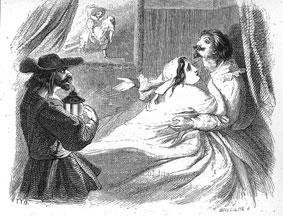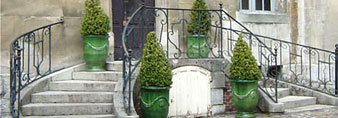Fable, Jean de La
Fontaine,
Book IX,
fables 12, 13, 14, 15 |
| |
THE WAX-LIGHT (IX,12)
The bees, they say, descending from the gods,
On Mount Hymettus fixed their first abodes,
To bask, and there rejoicing live,
In all the sweets that zephyrs give.
When from the palaces men dared convey
Of these fair daughters of celestial day
The ambrosial sweets that in their store-rooms lay,
In language plain, when honeyless were left
The combs, and they alone escaped the theft,
Many wax-lights and tapers then were made.
One of these seeing clay turned brick by fire,
Outliving time, conceived the same desire ;
A new Empedocles, with such mad head,
The wax-light plunged into the fiery bed.
The light was no philosopher, 'tis plain.
We're all diversified, let not your brain
Think any being modelled from your own :
The wax Empedocles was melted down ;
No greater wisdom's by his neighbour shown. |
JUPITER AND THE PASSENGER (IX, 13)
Rich were the gods, if perils were but paid,
If men remembered vows in danger made ;
But let the tempest pass, they little think
Of what they promised when about to sink.
The wretch safe landed leaves his vows behind :
" Jove's a good creditor," he cries, " and kind ;
He keeps no sheriffs at command.
What are his thunders then, that shake the land !
Should they not warn thee of his seizing hand ?"
During a storm a passenger had vowed
A hundred oxen to the Thunderer loud.
He had not one, and could have vowed with ease
A hundred elephants as well as these.
He burnt some bones when got ashore :
" There, Father Jove," he cried, " I have no more ;
'Tis oxen-incense to regale thy nose,
So take the smoke—and our accounts we close."
Jove seemed to smile upon his lofty plain ;
But shortly after tricked the rogue again,
Sent him a dream that roused him to the chase
Of certain treasure hid in such a place.
The man of vows in haste his pillow leaves,
And running, fell among a gang of thieves.
He had but just a single crown ;
But promised them a hundred talents down
Of solid gold-well counted safe and sound,
In such a village, hidden under ground.
The thieves suspected that he lied :
" Friend Promiser," one of them thus replied,
" You laugh at us ; but die-to Pluto go,
And take your hundred talents down below."
|
| .... |
| |

The husband, wife and thief (J.J. Grandville) |
THE CAT AND FOX (IX, 14)
The cat and fox, each like a little saint,
On pious pilgrimage together went ;
Two real Tartufes, two Patelins, birds of prey,
Soft-footed rogues, who paid or cleared the way,
Picking the bones of poultry, stealing cheese,
Rivalling each other. They the road to ease,
For it was tedious and long,
Oft shortened by contentions sharp and strong.
Dispute's a very happy source ;
Without it restless souls would sleep of course.
Our pilgrims with it made each other hoarse,
Quarrelled their fill, then dirt on neighbours cast.
Reynard said to the cat at last :
" Pretender, are you botter skilled than
Who could with tricks a hundred cats supply ? "
" No," said the cat, " I only boast of one,
But that's worth any thousand known."
Ready again their quarrel to begin,
With " Yes " and " No," through thick and thin,
The pack alarmed them, silencing their din.
" Friend," cried the cat, " now search your cunning brain,
Examine all your tricks, and search again.
For some sure plan—mine's ready, do you see ? "
He said, and quick sprang up a lofty tree.
Sly Reynard played a hundred pranks in vain,
Entered a hundred holes—escaped assault,
Put Finder and his brothers in default ;
..He sought asylum all around,
But he nowhere asylum found.
They watched the burrow where he hid so sly,
And smoked him out—two terriers were nigh,
Who worried him as lie went bounding by.
Avoid too many schemes ; there ruin lies ;
For while we choose, the happy moment flies.
Have but one plan, and let that plan be wise.
|
THE HUSBAND, WIFE, AND THIEF
(IX, 15)
A husband of the fonder kind
Doated upon his wife, we find :
Though she was his, yet wretched was his mind.
No loving glances from the dame,
No pretty flattering tender name,
No so othing epithet nor sweet soft smile,
No cheering speech that might his doubts beguile,
If he to her might be as dear.
He was a husband, and he well might fear.
Twas not the merely wedded state,
If doomed to murmur with his fate,
Should make him thank the gods above.
How thank the gods, unless we prove
The Miss that Hymen gives to love ?
I don't see that we're better by the change.
Such was our lady's disposition strange ;
So cold indifferent a wife,
She never had caressed him in her life.
One night our man expressed his discontent ;
A robber entering, ended his lament ;
The lady, trembling with alarms,
For shelter sprang into her husband's arms.
"Friend thief," he cried, "I owe this bliss to thee ;
Except my wife, take all that thou canst see-
Take house and all." Robbers are never graced
With modesty, nor are they timid-faced ;
He made his booty. From this tale we find
That fear's the strongest passion of the mind :
It vanquishes aversion, sometimes love.
Love sometimes conquers fear, as we can prove
By that bold lover, for his favoured dame
Who fired his house, and bore her through the flame.
I love to see the passions take such flight ;
This tale has ever given me delight :
For worthy of a Spaniard's breast it glows,
And more of greatness than of folly shows
|
|
|
|



